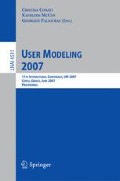Abstract
In this paper, we propose and validate a model of the ‘intention to use’ adaptive audio-video guides in a museum setting, extending TAM to include intrinsic motivational factors (involvement, attention) and constructs specific to adaptivity (control, personalization). The results of a PLS analysis ran on the data from 115 subjects show that for adaptive museum guides intention to use is not affected by such traditional construct as perceived ease of use, whereas perceived usefulness and enjoyment play an important role. Also, both personalization and control are causally relevant, the former affecting enjoyment and the latter the perceived usefulness.
Access this chapter
Tax calculation will be finalised at checkout
Purchases are for personal use only
Preview
Unable to display preview. Download preview PDF.
References
Agarwal, R., Karahanna, E.: Time Flies when You’re Having Fun: Cognitive Absorption and Beliefs about Information Technology Usage. MIS Quarterly 24, 665–694 (2000)
Baus, J., Krüger, A., Wahlster, W.: A Resource-Adaptive Mobile Navigation System. In: Proceedings of the 7th International Conference on Intelligent User Interfaces (IUI 2002), San Francisco, CA , pp.15–22 (2002)
Brusilovsky, P., Maybury, M.T.: From adaptive hypermedia to the adaptive Web. Communications of the ACM 45, 30–33 (2002)
Cheverst, K., Davies, N., Mitchell, K., Friday, A., Efstratiou, C.: Developing a Context-aware Electronic Tourist Guide: Some Issues and Experiences. In: Proceedings of CHI 2000, pp.17–24. The Netherlands (2000)
Chin, W.: The Partial Least Square Approach to Structural Equation Modelling. In: Marcoulides, G.A. (ed.) Modern Methods for Business Research, Lawrence Erlbaum Associates, Mahwah, NJ (1998)
Chin, W.W., Gopal, A.: Adoption Intention in GSS: Relative Importance of Beliefs. Data Base Advances 26, 42–64 (1995)
Csikszentmihalyi, M.: Beyond Boredom and Anxiety. Jossey-Bass, San Francisco (1977)
Csikszentmihalyi, M., Csikszentmihalyi, I.: Introduction to Part IV. In: Csikszentmihalyi, M., Csikszentmihalyi, I.S. (eds.) Optimal Experience: Psychological Studies of Flow in Consciousness, Cambridge University Press, Cambridge (1988)
Davis, F.D.: Perceived Usefulness, Perceived Ease of Use, and User Acceptance of Information technology. MIS Quarterly 13, 319–340 (1989)
Davis, F.D.: User acceptance of information technology: system characteristics, user perceptions and behavioural impacts. International Journal of Man-Machine Studies 38(3), 475–587 (1993)
Fornell, C., Bookstein, F.: Two Structural Equation Models: LISREL and PLS Applied to Consumer Exit-Voice Theory. Journal of Marketing Research 19, 440–452 (1982)
Ghani, J.A., Deshpande, S.P.: Task Characteristics and the Experience of Optimal Flow in Human-Computer Interaction. The Journal of Psychology 128, 381–391 (1994)
Gefen, D., Straub, D.: A Practical Guide to Factorial Validity Using PLS-Graph: Tutorial and Annotated Example. Communications of the Association for Information Systems 16, 91–109 (2005)
Goren-Bar, D., Graziola, I., Pianesi, F., Zancanaro, M.: The Influence of Personality Factors on Visitor Attitudes towards Adaptivity Dimensions for Mobile Museum Guides. User Modelling and User Adapted Interaction: The Journal of Personalization Research 16, 31–62 (2006)
Hoyle, R.: Structural equation modeling: concepts, issues and applications. Sage, Thousand Oaks, Ca (1995)
Jameson, A., Schwarzkopf, E.: Pros and Cons of Controllability: An Empirical Study. In: Brusilovsky, P., Conejo, E. (eds.) Adaptive Hypermedia and Adaptive Web-based Systems: Proceedings of AH 2002, pp. 193–202. Malaga, Spain (2002)
Jameson, A.: Adaptive Interfaces and Agents. In: Jacko, J., Sears, A. (eds.) Human-computer interaction handbook, pp. 305–330. Erlbaum, Mahwah, NJ (2003)
Kelloway, E.K.: Using LISREL for structural equation modeling: a researcher’s guide. Sage, Thousand Oaks, Ca (1998)
Kim, T., Biocca, F.: Telepresence via Television: Two Dimensions of Telepresence May Have Different Connections to Memory and Persuasion. Journal of Computer-Mediated Communication 3(2) (September 1997)
LeFevre, J.: Flow and the Quality of Experience During Work and Leisure. In: Csikszentmihalyi, M., Csikszentmihalyi, I. (eds.) Optimal Experience: Psychological Studies of Flow in Consciousness, Cambridge University Press, Cambridge (1988)
Lohmöller, J.B.: Latent Variable Path Modelling with Partial Least Squares. Physica-Verlag, Heidelberg (1989)
Norman, D.: Emotional Design: Why we love (or hate) everyday things. Basic Books, NY (2004)
Novak, T.P., Hoffman, D.L., Yung, Y.F.: Measuring the customer experience in on-line environments: a structural modelling approach. Marketing Science 19, 22–42 (2000)
Oppermann, R., Specht, M.: A Context-Sensitive Nomadic Information System as an Exhibition Guide. In: Thomas, P., Gellersen, H.-W. (eds.) HUC 2000. LNCS, vol. 1927, pp. 127–142. Springer, Heidelberg (2000)
Petrelli, D., Not, E.: User-centred design of flexible hypermedia for a mobile guide: reflections on the hyperaudio experience. User Modelling and User-Adapted Interaction 15, 303–338 (2005)
Popovich, P.M., Hyde, K.R., Zakrajsek, T., Blumer, C.: The development of the Attitudes Toward Computer Usage Scale. Educational and Psychological Measurement 47, 261–269 (1987)
Rocchi, C., Zancanaro, M.: Rhetorical Patterns for Adaptive Video Documentaries. In: Proceedings of Adaptive Hypermedia Conference, pp. 324–327. Eindhoven, The Netherlands (2004)
Rocchi, C., Graziola, I., Goren-Bar, D., Stock, O.: Adaptive multimedia guide. In: PEACH: Intelligent Interfaces for Museum Visits. Cognitive Technologies Series, Springer, Heidelberg (2006)
Stokmans, M.J.W.: Reading attitude and its effect on leisure time reading. Poetics 26, 245–261 (1999)
Venkatesh, V.: Creating Favorable User Perceptions: Exploring the Role of Intrinsic Motivations. MIS Quarterly 23, 239–260 (1999)
Werts, C.E., Linn, R.L., Jöreskog, K.G.: Intraclass Reliability Estimates: Testing Structural Assumptions. Educational and Psychological Measurement 34, 25–33 (1974)
Author information
Authors and Affiliations
Editor information
Rights and permissions
Copyright information
© 2007 Springer-Verlag Berlin Heidelberg
About this paper
Cite this paper
Pianesi, F., Graziola, I., Zancanaro, M. (2007). Intrinsic Motivational Factors for the Intention to Use Adaptive Technology: Validation of a Causal Model. In: Conati, C., McCoy, K., Paliouras, G. (eds) User Modeling 2007. UM 2007. Lecture Notes in Computer Science(), vol 4511. Springer, Berlin, Heidelberg. https://doi.org/10.1007/978-3-540-73078-1_29
Download citation
DOI: https://doi.org/10.1007/978-3-540-73078-1_29
Publisher Name: Springer, Berlin, Heidelberg
Print ISBN: 978-3-540-73077-4
Online ISBN: 978-3-540-73078-1
eBook Packages: Computer ScienceComputer Science (R0)

